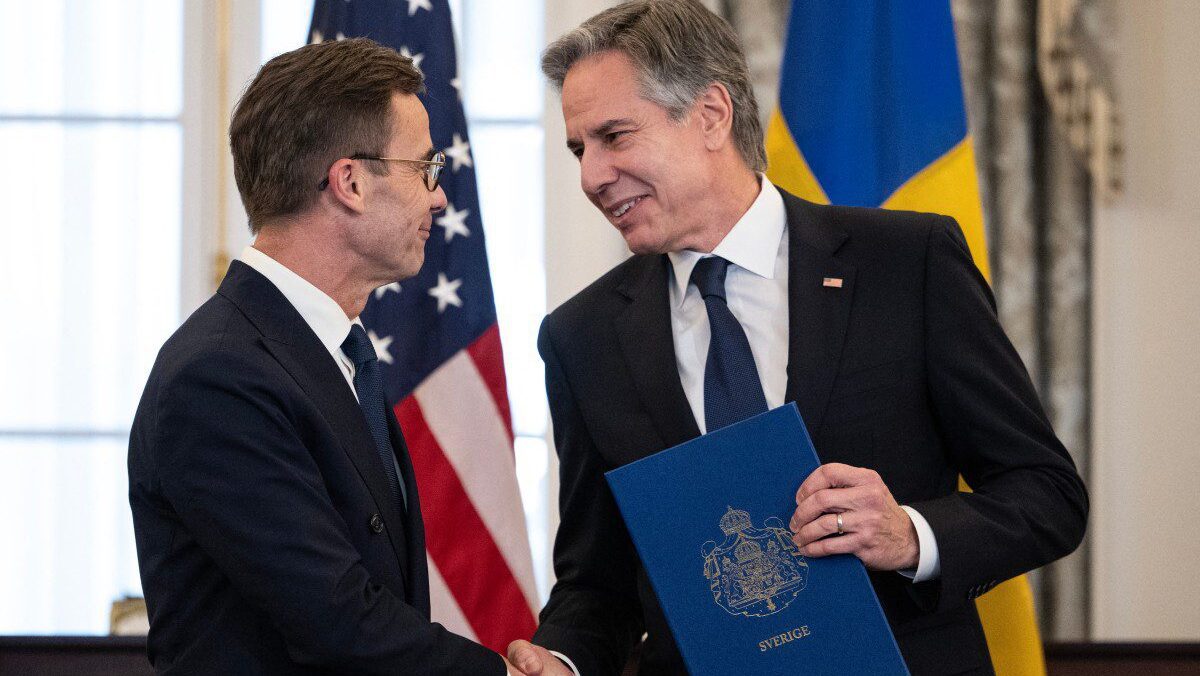
US Secretary of State Antony Blinken receives the NATO ratification documents from Swedish Prime Minister Ulf Kristersson during a ceremony at the US State Department, as Sweden formally joins the North Atlantic alliance, in Washington, DC, on March 7, 2024.
Photo: ANDREW CABALLERO-REYNOLDS / AFP
On Thursday, March 7th, Sweden officially became the 32nd member of NATO, ending two centuries of official non-alignment and capping two years of diplomatic negotiations.
Swedish Prime Minister Ulf Kristersson and Foreign Affairs Minister Tobias Billström on Thursday visited Washington, where U.S. Secretary of State Antony Blinken ceremonially received the ratification documents after all NATO members had approved the country’s application.
“We are humbled, but also proud,” PM Kristersson said at the event.
NATO Secretary-General Jens Stoltenberg called the event “a historic day” in a statement, and said,
Sweden will now take its rightful place at NATO’s table, with an equal say in shaping NATO policies and decisions. … After over 200 years of non-alignment, Sweden now enjoys the protection granted under Article 5, the ultimate guarantee of allies’ freedom and security.
The Swedish government earlier in the day had held a special government meeting and approved the accession. In a press conference in Stockholm, following the Washington D.C. ceremony, Sweden’s Deputy PM Ebba Busch welcomed the alliance:
Now begins a new chapter in the history of the Kingdom of Sweden. Now we build security, peace, and freedom together with others. The NATO membership strengthens our democratic values—our way of life. We do this for our beloved homeland and for all that makes us unique, to protect that.
The entry into NATO is a historical event of magnitude, a milestone for our country. … We belong with the free democracies in the West. Difficult problems are best solved together.
Carl Bildt, former PM and former foreign minister, said to Swedish daily Dagens Nyheter:
We have had an influence deficit when we have been outside crucial discussions within the NATO circle regarding Europe’s security. Now, we will be at the table in both the EU and NATO – a massive change compared to the days of the Cold War.
But not everyone is thrilled with giving up the non-alignment policy. A recent poll by Swedish broadcaster SR said that 55% of Swedes believe the country made too many sacrifices to join NATO, although more than three-quarters believed NATO would strengthen the country’s security. Karin Bergeå, ordförande för Svenska Freds- och Skiljedomsföreningen (The Swedish Peace & Arbitration Society), an NGO working for “sustainable peace and freedom,” said in a press release:
Membership in NATO is a risky and costly misallocation of priorities that contributes to increased military rearmament, normalization of nuclear weapons, and heightened tensions at a time when we need the opposite. Sweden’s nuclear policy and its voice for peace and disarmament have already been significantly weakened.
Sweden’s blue and golden-yellow flag is expected to be hoisted on Monday at the Brussels headquarters of the North Atlantic Treaty Alliance.
